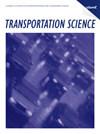具有库存削减约束的报贩模型下的运输资产收购:近似与分解算法
IF 4.4
2区 工程技术
Q1 OPERATIONS RESEARCH & MANAGEMENT SCIENCE
引用次数: 0
摘要
物流服务商利用运输资产为客户提供服务。为了应对需求的变化,他们可能会一次性(现货)收购额外的资产。计划者的问题是确定预先获得资产的最佳水平,以便在给定的规划范围内使其成本最小化。我们的公式捕获了一个重要的复杂性:尽管订购数量与资产获取相关,但客户需求是以服务请求的形式出现的。不仅每个请求的持续时间是随机的,而且每个客户的请求总数也是不确定的。我们引入了一个两阶段的报摊模型,其中对现货资产的需求是通过最优削减库存模式推导出来的。利用装箱的结果,我们提出了对上界和下界具有最坏情况保证的多项式算法。我们的方法找到商业求解器难以解决的实例的最优解。我们通过一个析因实验来研究需求变化。我们发现,尽管请求数量的可变性会导致更高的成本,但每个请求持续时间的可变性可以降低成本。最后,我们用两个扩展来演示我们方法的模块化:资产路由和外包。我们的研究结果为运输资产收购提供了一种实用的方法,并对需求不确定性对总收购成本的不同影响提供了见解。补充材料:在线附录可在https://doi.org/10.1287/trsc.2023.1201上获得。本文章由计算机程序翻译,如有差异,请以英文原文为准。
Transportation Asset Acquisition under a Newsvendor Model with Cutting-Stock Restrictions: Approximation and Decomposition Algorithms
Logistics service providers use transportation assets to offer services to their customers. To cope with demand variability, they may acquire additional assets on a one-off (spot) basis. The planner’s problem is to determine the optimal level of assets acquired upfront, such that their cost is minimized, for a given planning horizon. Our formulation captures a nontrivial complication: Although ordering quantities are pertinent to asset acquisition, customer demand is in the form of service requests. Not only does each request have a stochastic duration, but also the total number of requests per customer is uncertain. We introduce a two-stage newsvendor model where demand for spot assets is derived through optimal cutting-stock patterns. Leveraging results from bin-packing, we propose polynomial algorithms that have worst-case guarantees for upper and lower bounds. Our method finds optimal solutions to instances intractable by commercial solvers. We investigate demand variability by means of a factorial experiment. We find that, whereas variability in the number of requests leads to higher costs, variability in each request’s duration can reduce costs. Finally, we demonstrate the modularity of our approach with two extensions: asset routing and outsourcing. Our results provide a practical approach to transportation asset acquisition and offer insights on the differing impact of demand uncertainty on the total acquisition cost. Supplemental Material: The online appendix is available at https://doi.org/10.1287/trsc.2023.1201 .
求助全文
通过发布文献求助,成功后即可免费获取论文全文。
去求助
来源期刊

Transportation Science
工程技术-运筹学与管理科学
CiteScore
8.30
自引率
10.90%
发文量
111
审稿时长
12 months
期刊介绍:
Transportation Science, published quarterly by INFORMS, is the flagship journal of the Transportation Science and Logistics Society of INFORMS. As the foremost scientific journal in the cross-disciplinary operational research field of transportation analysis, Transportation Science publishes high-quality original contributions and surveys on phenomena associated with all modes of transportation, present and prospective, including mainly all levels of planning, design, economic, operational, and social aspects. Transportation Science focuses primarily on fundamental theories, coupled with observational and experimental studies of transportation and logistics phenomena and processes, mathematical models, advanced methodologies and novel applications in transportation and logistics systems analysis, planning and design. The journal covers a broad range of topics that include vehicular and human traffic flow theories, models and their application to traffic operations and management, strategic, tactical, and operational planning of transportation and logistics systems; performance analysis methods and system design and optimization; theories and analysis methods for network and spatial activity interaction, equilibrium and dynamics; economics of transportation system supply and evaluation; methodologies for analysis of transportation user behavior and the demand for transportation and logistics services.
Transportation Science is international in scope, with editors from nations around the globe. The editorial board reflects the diverse interdisciplinary interests of the transportation science and logistics community, with members that hold primary affiliations in engineering (civil, industrial, and aeronautical), physics, economics, applied mathematics, and business.
 求助内容:
求助内容: 应助结果提醒方式:
应助结果提醒方式:


